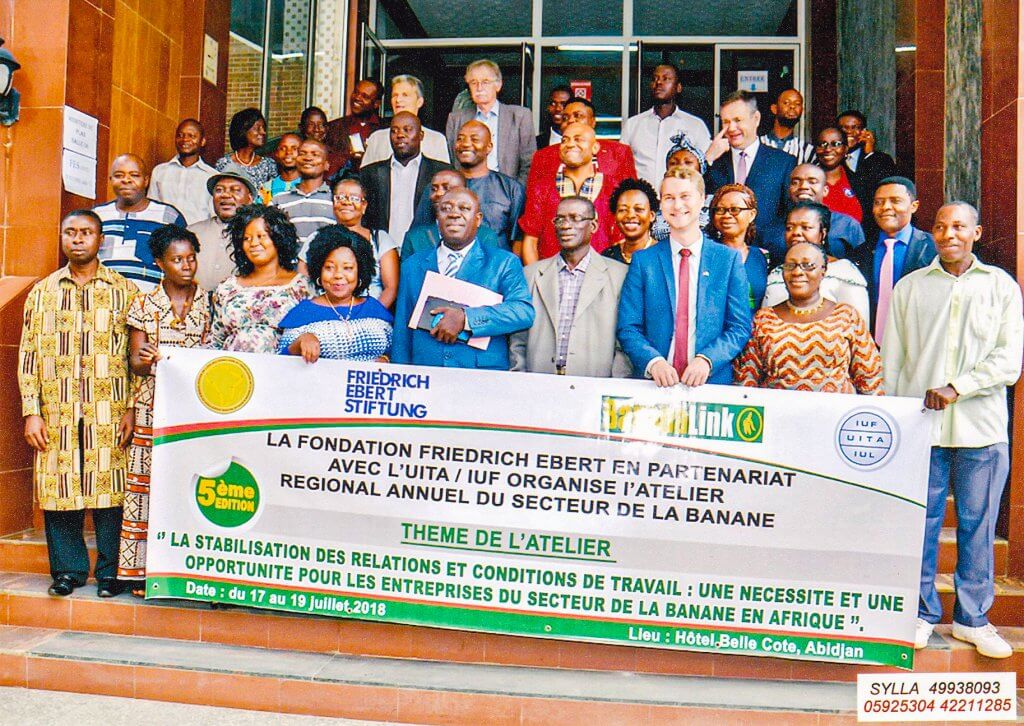Strong and influential trade unions are the foundation for true social justice in the world of work, as much in Africa as in any other continent on the planet.
Banana Link’s Policy & Communications Officer, Paul Lievens, takes a look at a recent report published jointly by Banana Link and the International Union of Foodworkers (IUF) which examines the situation of workers employed in banana export production in Africa, and why a united voice is necessary to address the challenges faced on plantations.
The banana sector in Africa
Latin America continues to dominate international trade with six of the seven main exporting countries supplying 80% of the global market. The top exporting African country is Côte d’Ivoire, currently in eighth place in global rankings, whilst Cameroon is tenth and Ghana fourteenth.

The banana export sector in Africa has been expanding over the last decade. It is characterised by a number of key elements, including:
- companies that operate on an industrial scale and are recruiting workers;
- the investment of significant sums of money;
- the creation of direct and indirect jobs;
- industrial production that operates almost exclusively in a monocultural system with production geared towards exports;
- a ‘hidden’ presence of small producers who are not well organised or structured;
- a small percentage of the total volume of production is earmarked for local or sub-regional consumption; and
- salaries that constitute income for several tens of thousands of employees.
However, decent working conditions and good industrial relations are lacking in some parts of the industry. In the francophone countries there is obsolete national legislation that no longer reflects the reality of the working environment, while some companies take advantage of completely outdated minimum wage levels to minimise labour costs and maximise profits.
Moreover, the current level of worker representation, social dialogue and collective bargaining is unable to meet the needs of workers. Many find themselves grouped into micro-organisations, resulting from the fragmentation and proliferation of trade unions, with low capacity, leading to unequal power relations and unfavourable outcomes for workers and their causes. The specific rights of women workers are still not recognised or respected in many cases.
Meanwhile, in some companies, human rights in the workplace are not respected at all, with workers unable to organise into unions for fear of being sacked or of other forms of retaliation.
The state of African trade unions
Ten years ago, banana workers’ unions in Africa were unaware of each other’s existence. Workers themselves had even less awareness of the various trade unions representing those employed in the banana sector. National borders and language barriers between countries, and language barriers within Cameroon, meant workers had little contact with each other. And this was despite the fact that more than half of African workers were employed by the same company.
This proliferation of trade union organisations, with their divergent ideological and political affiliations, their competing leaderships and, above all, the dubious credentials of some of the people in charge, has not led to the sort of unified, effective and results-oriented trade union action that could meet workers’ expectations.
To address this, the IUF and Banana Link have supported the creation of trade union platforms as an umbrella structure in a given company. These unitary platforms have become the sole vehicle for conducting dialogue between workers’ representatives and management. Platforms have already been established at Plantations de Haut Penja (PHP) in Cameroon and at SCB in Côte d’Ivoire.
The need for a New Social Dynamic
Along with supporting the building of platforms, the IUF and Banana Link have also sought to introduce other procedures to unite all social forces within a company, a process known as the trade union “New Social Dynamic”. Union leaders and company managers meet in regular social dialogue about a wide range of issues affecting the company, think together, act together and evaluate the results of actions together.
Working to unite all social forces within companies has enabled qualitative improvements to the representation of workers, labour relations and working conditions, along with the first signs in qualitative improvements to collective bargaining.
Drawing on experience in Latin America
The experience gathered by Latin American plantation trade unions over the last 25 years, through their continent-wide coordinating body, is of huge value for the African trade unions as they have embarked on a similar path over the last 5 years.
The work of the Coordinating Body of Latin American Banana and Agroindustrial Unions (COLSIBA) illustrates how more strategic unity of action leads to a stronger trade union movement, while also identifying the risks and challenges to coordinated action, such as maintaining a common agenda and sense of purpose; the need for resources to be devoted to education and training; and the need to train a new generation of women union leaders on common issues and shared ideas and values.
Focus on a key player: Compagnie Fruitiere
With more than 9,000 hectares of bananas planted in the three main African exporting countries, Compagnie Fruitière is by far the largest export producer on the African continent in terms of volumes exported, number of employees and logistical capacity, and the largest private employer in Cameroon and the second largest in Côte d’Ivoire.
Over recent years the company has demonstrated a real political will to become a responsible corporate citizen in all spheres of its operation and influence. The development of its relations with the twelve trade unions present in its three African subsidiaries confirm that the company has taken strides in a constructive direction that bodes well for the future.
The unions hope now to take the next step and have plans to negotiate an international framework agreement with Marseille-based Compagnie Fruitière. This move could turn out to be as influential in the banana world as the company’s accelerated evolution of its organic and agroecological production methods.
Key challenges to be addressed
The challenges in the African banana sector are numerous and complex. The report identifies those that appear most pressing:
- Tactics and tools must be found to engage companies that are reluctant to respect fundamental human rights, so that they view the exercise of freedom of association by their employees not as an obstacle to their activities, but rather as a means of achieving mutually beneficial development.
- The concepts and practices of development-oriented trade unionism will free some unions from the straitjacket of certain practices that are all too common in traditional trade unionism. The independence of the organised voice of workers is essential to make this transition.
- It will be necessary to proactively promote an increasing number of women in trade union leadership positions through the ongoing treatment of issues such as women’s employment (how to overcome obstacles to women accessing employment), discrimination in the workplace in all its forms and the elimination of violence and sexual harassment.
- Given the radically different levels of remuneration within the same workplace in Côte d’ivoire in particular, a specific campaign is required to eliminate social disparities and working conditions for those working on plantations.
- Businesses must be able to operate in a balanced and fair global market environment if we are to guarantee the future of jobs that allow employees to make a decent living.
- To provide a basis for the construction of stable and equitable economic relations, it is a responsibility of both parties to foster and maintain relationships through regular formal and informal mechanisms.
- An international framework agreement with Compagnie Fruitière would provide a blueprint for the basis of fruitful relations for both parties and would have a demonstrable effect on other companies and unions in the sector.
- Advocacy with government institutions in exporting countries must be built in a more structured and strategic way across governments, and not just their labour authorities.
- The linguistic barrier between English and French speakers remains to be resolved, especially outside annual workshops of the regional network where professional interpreters can be hired.
- A more systematic communication with COLSIBA through a South-South programme is proving to be a promising avenue for strategic discussions, exchanges of practices and policies, and intercontinental solidarity in the face of the most powerful stakeholders in the sector.
- In order to achieve permanent and full participation in the working groups and conferences of the World Banana Forum, resources should be made available for this purpose, as well as for those in a position to facilitate such permanent participation.
This a big agenda and the road will be long, but the organised banana workers are already walking along that road. Banana Link calls on all those of good faith, and in a position to support the realisation of the African banana worker agenda, to be in touch with the IUF network coordinator in Benin or with us in Europe.
It goes without saying that the role of responsible employers in ensuring this agenda can be addressed constructively over the coming years is crucial. Without their understanding and active collaboration, the future cannot be co-constructed.
Download the report:
A United Voice for Banana Workers in Africa
Hacia una Voz Unitaria de los y las Trabajadores Bananeros en Africa
Vers une Voix Unitaire des Travailleurs et Travailleuses de la Banane en Afrique
Photo: a meeting of African banana workers trade unions in Abidjan, Côte d’Ivoire in 2018 (Banana Link)
